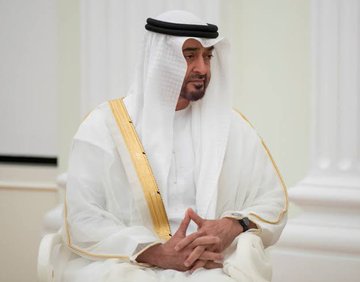The ruler of the United Arab Emirates (UAE), Sheikh Mohammed bin Zayed Al Nahyan, has made a significant move by appointing his son, Sheikh Khaled bin Mohammed bin Zayed Al Nahyan, as the crown prince of Abu Dhabi. This strategic decision places Sheikh Khaled as the second-in-line to the leadership of the major OPEC oil-exporting nation, bypassing older and more experienced royals in the process. The Al Nahyan ruling family, among the world's wealthiest, has a net worth of at least $300 billion, with complex holdings analyzed by the Bloomberg Billionaires Index. The UAE holds about 6% of the world's proven oil reserves and boasts substantial sovereign wealth funds.
This generational shift in leadership dynamics, favoring a son over a brother, mirrors a trend seen previously in Saudi Arabia with the ascent of Crown Prince Mohammed bin Salman. In Gulf monarchies, power transition pathways may involve brothers, cousins, and sons.
Sheikh Khaled, aged 43, has been groomed for leadership through his membership in the influential Abu Dhabi Executive Council and the primary national security body since 2016. His extensive experience in positions related to oil, the economy, and governance aligns with the broader pattern of state centralization and the consolidation of ruling lines seen within Gulf monarchies.
Sheikh Mohammed has also expanded the roles and responsibilities of powerful siblings, further solidifying the family's influence. Sheikh Tahnoon bin Zayed, the current UAE national security adviser, and Sheikh Hazza have been appointed deputy rulers of Abu Dhabi. Sheikh Tahnoon, recently named chairman of the $790 billion sovereign wealth fund Abu Dhabi Investment Authority, wields substantial behind-the-scenes influence in shaping the UAE's security policy and is a key figure in Abu Dhabi's business landscape.
Sheikh Mansour bin Zayed, named the UAE's vice president, is a well-known figure both within and outside the country. He owns Manchester City Football Club, serves as chairman of the central bank, Mubadala Investment Co. and holds leadership positions in various UAE-based firms.
Sheikh Khaled, the newly appointed crown prince, has not only been integral to the UAE's security establishment but has also demonstrated a keen interest in information technology, particularly in nurturing talent within the sector. He currently heads Abu Dhabi's executive office, a crucial supervisory body in the emirate's government.
This new generation of leaders will face critical challenges, including navigating the UAE's energy transition and achieving its 2050 net-zero target, a significant commitment among Gulf crude producers. They will also work to maintain the UAE's position as the Middle East's business and tourism hub, even amidst growing competition from Saudi Arabia. The decisions made by Sheikh Mohammed and his family, known as the Bani Fatima, will shape the future of the UAE's political and economic landscape.








 OpinionExpress.In
OpinionExpress.In















Comments (0)